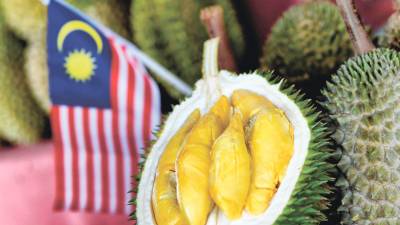YOU can smell it before you see it. That thick, heady aroma curling through the air signals one thing: durian season is back. For many Malaysians, it is more than just a fruit; it is a feeling. A yearly ritual marked not on calendars but in the nose and memory.
There is something unmistakably Malaysian about the sight of a roadside stall glowing under fluorescent light, its tables piled high with thorny green orbs, the air alive with the sound of bargaining, laughter and debate over which variety reigns supreme.
Durian isn’t just food; it is nostalgia, identity and the shared joy of prying open a fruit that has been passed down through generations – sticky fingers, creamy flesh and bittersweet perfection.
And yet this season, the joy feels a little different. Not gone but edged with something quieter: hesitation.
Even the humble kampung durian is now pushing RM15/kg. Musang King? That is a conversation for another tax bracket.
Where once we would buy without thinking, maybe even sit down for an impromptu feast by the roadside, now we pause, do the mental math and wonder if the treat is worth the pinch.
For many in the M40, it is a familiar tug-of-war. We earn just enough to miss out on aid but not quite enough to ride above the inflationary tide.
Petrol, tolls, groceries and school expenses – everything feels like it is creeping higher. And in between the big bills and budget spreadsheets, even the small indulgences start to feel like luxuries.
The durian has become a symbol of this quiet squeeze – once an unpretentious, seasonal joy, it now requires planning, compromise and sometimes even sacrifice.
A fruit that once brought spontaneous pleasure now involves group buys, budget discussions and the odd sheepish glance at your bank app.
Still, we gather. Because despite the price tag, the durian’s power lies in how it brings us together. The stall is one of the few spaces where all of Malaysia converges – shoulder to shoulder, nose to nose, bargaining over a D24 or defending the supremacy of a Tekka.
A Malay pak cik and a Chinese aunty may argue over which batch smells stronger. An Indian anne may chime in about how the kampung variety beats them all. No one cares who you voted for or what God you pray to, what matters is how bitter you like your flesh and whether you can open the fruit without a knife. That, to me, is Malaysia at its purest.
And as odd as it sounds, my own durian ritual is a solitary one. My 10-year-old son has a gag reflex that activates the moment he catches a whiff. My seven-year-old autistic daughter experiences the smell as an assault on her senses, turning away with quiet resolve. So, I eat it alone, crouched in the kitchen like a criminal hiding my loot.
But in that moment, I feel more grounded than at any Deepavali open house or long table filled with familiar faces and old stories.
Of course, there is a reason the prices have soared. Our beloved Musang King has become an international celebrity, especially in China, where it fetches eye-watering prices. Export demand has turned local farms into global suppliers and we, the fruit’s first lovers, are now left to compete for a smaller slice of the pie.
Add to that, the increasingly erratic weather – too much rain, sudden heatwaves – and you get smaller harvests, tougher farming conditions and ultimately, a steeper price per seed.
In response, the government has introduced small but meaningful initiatives like the Rahmah Madani Sales where local fruits, including durian, are sold at subsidised prices through mobile stalls and community markets. I recently stumbled upon one outside a local pasar.
There was nothing polished about it – just a makeshift stall with handwritten prices and crates of fruit – but it felt honest. The durians were good, the prices kind and the people came from every walk of life.
A Malay dad and his son stood next to a Chinese aunty with two durians tucked under her arm. Behind me, a young Indian couple whispered in Tamil, debating if they could afford a second fruit. In that queue, for a few minutes, everything felt right.
The Rahmah sales may not solve the problem entirely but they do send a clear message: this joy should still be within reach. It should not just be an export commodity or a high-end delicacy; it should remain what it has always been – ours.
Because in the end, the durian is not just about taste; it is about memory. It is about belonging. It is about the way we Malaysians, regardless of race, income or postcode, are bound by the same seasonal craving.
So, maybe we buy less, maybe we downgrade from Musang King to D13 or maybe we eat it at home in quiet rebellion, but we still eat it. We still make space for it because some pleasures are worth preserving. Not for extravagance but for identity.
And as long as I can still afford even a single seed, I will eat it with my hands, without guilt and with the quiet conviction that in this creamy, stubborn joy, I am holding on to something much bigger than fruit; I am holding on to who we are.
Hashini Kavishtri Kannan is the assistant news editor of theSun. Comments: letters@thesundaily.com
